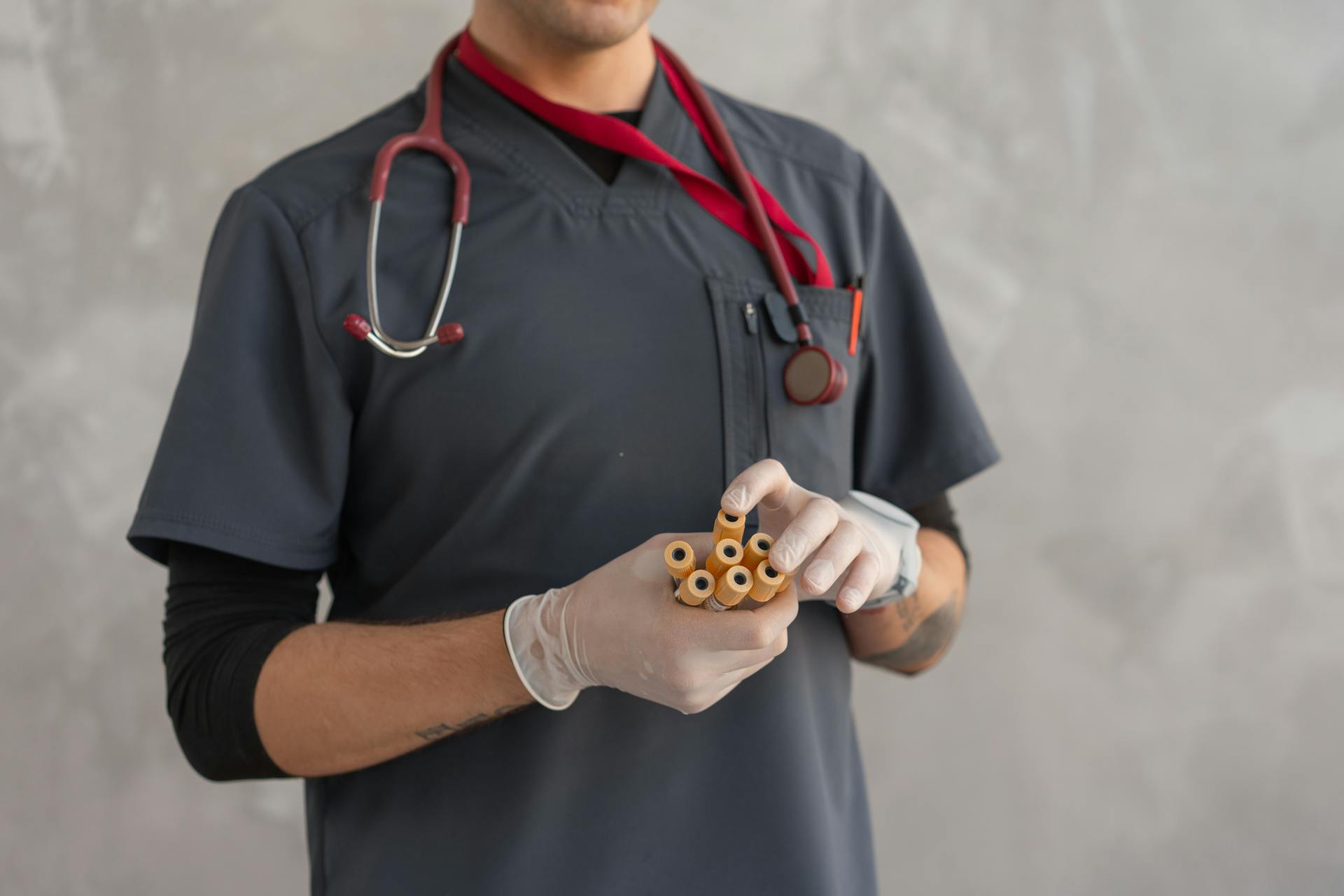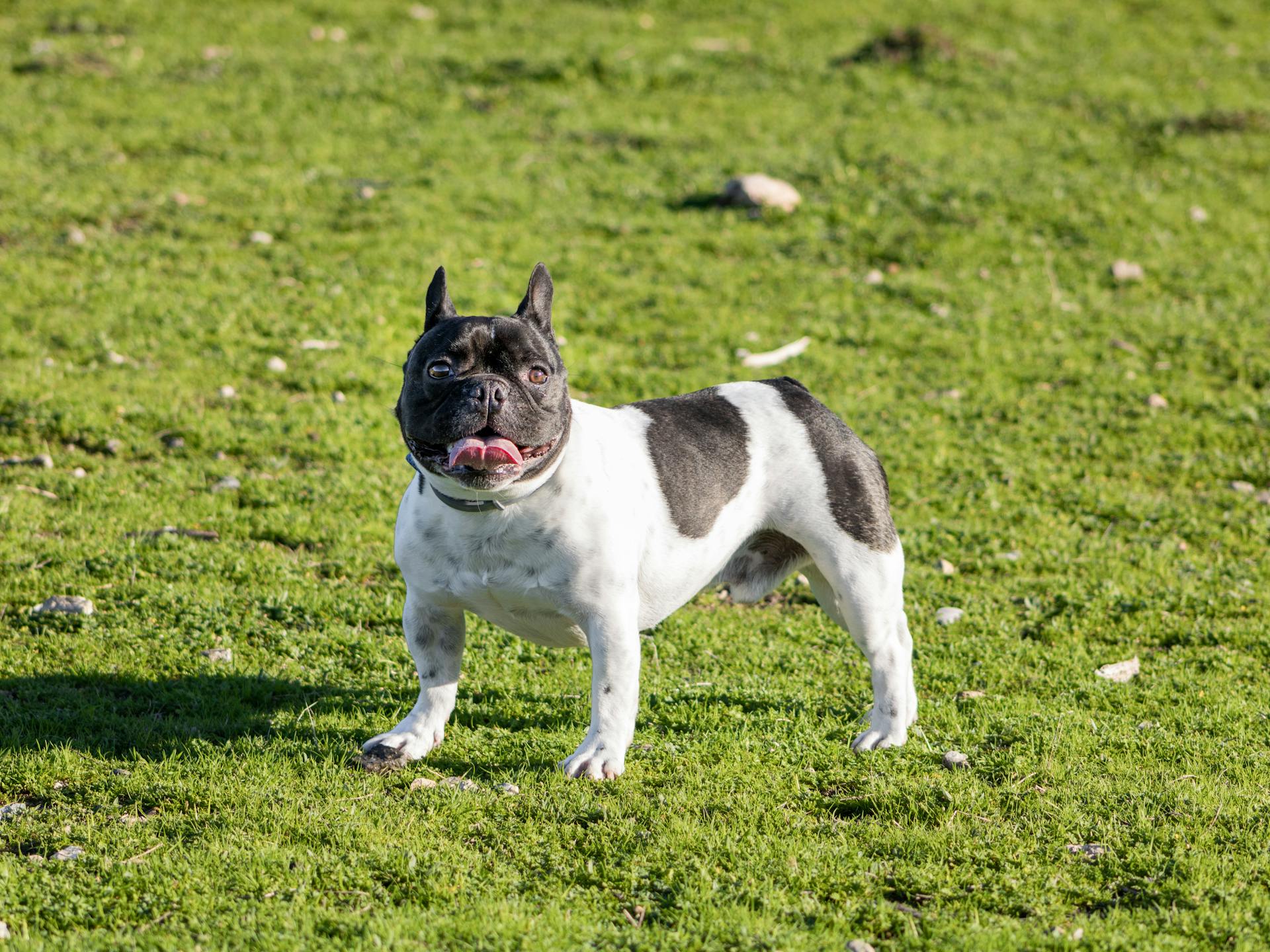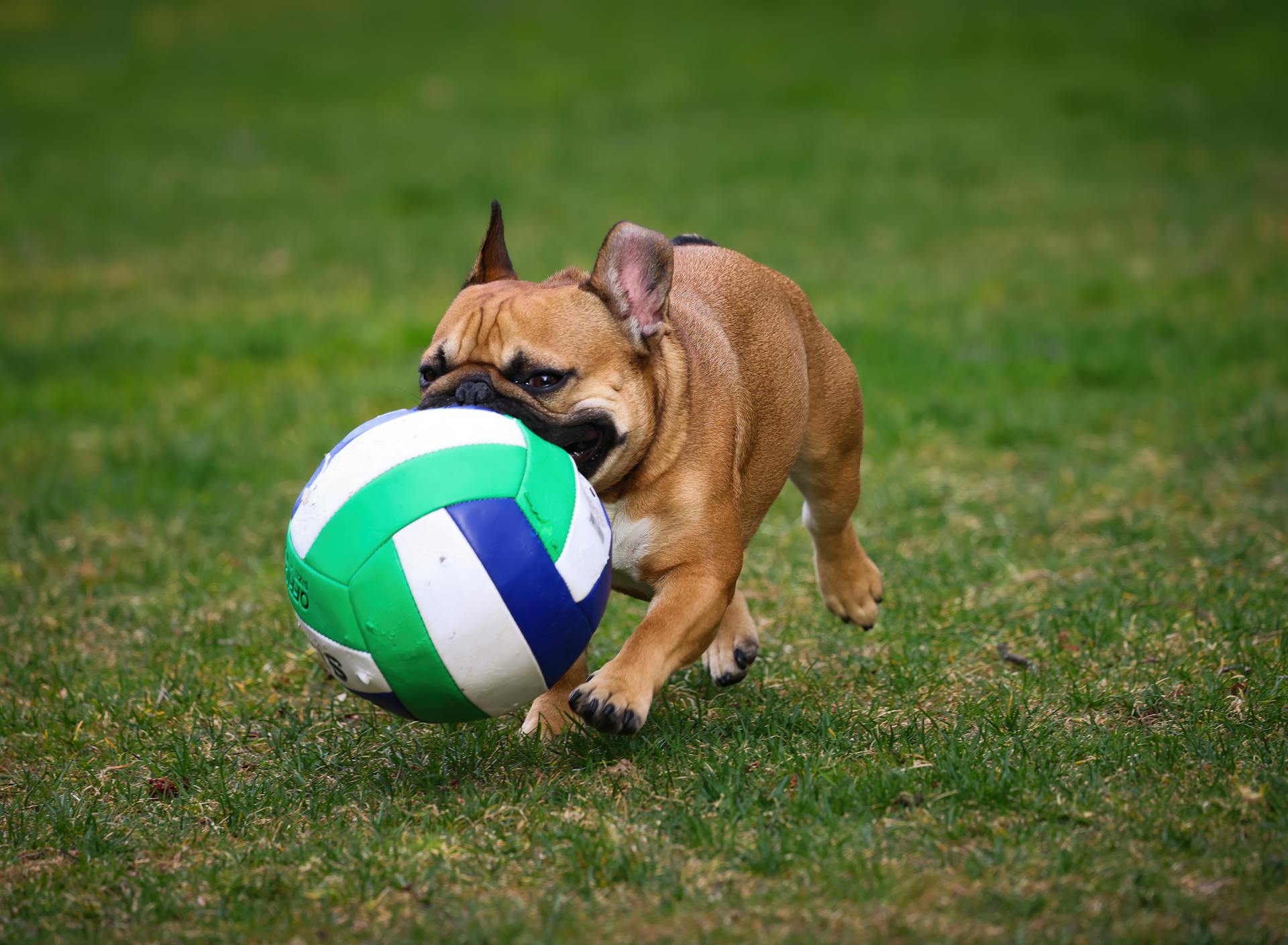
French Bulldogs are a beloved breed, known for their playful, affectionate, and adaptable nature. They're a relatively small dog with a big personality.
French Bulldogs have a unique genetic makeup that can make them prone to certain health issues. These include respiratory problems, allergies, and joint issues, which can be costly to treat.
To better understand your French Bulldog's genetic predispositions, a DNA test can be a valuable tool. This test can identify potential genetic risks and provide insights into your dog's ancestry.
See what others are reading: Embark Breed & Health Dog Dna Test
DNA Testing for French Bulldogs
DNA testing is a must for French Bulldog breeders, but it's not foolproof. Some genetic markers, like the one for Degenerative Myelopathy (DM), have been found to be inaccurate.
You should take the time to research what markers mean for your breed, as some common health markers for French Bulldogs include Cystinuria Type3 (C3), Intervertebral Disc Disease (IVDD), Juvenile Hereditary Cataracts (JVC), Hyperuricosuria (HUU), and Canine Multifocal Retinopathy 1 (CMR1).

A full panel test kit usually costs around $200 USD, which may be worth it to get a comprehensive understanding of your pup's genetic health.
Some of the genetic health conditions that can affect French Bulldogs include Canine Multifocal Retinopathy 1 (CMR1), Chondrodystrophy (CDDY), and Hyperuricosuria (HUU).
Here are some of the genetic health conditions that can be tested for in French Bulldogs:
- Canine Multifocal Retinopathy 1 (CMR1)
- Chondrodystrophy (CDDY)
- Hyperuricosuria (HUU)
Performing a Dog DNA Test
To get started with a dog DNA test, you'll need to choose a testing facility. Some popular options include Animal Genetics, UC Davis, and Vetgen. I've seen reviews that suggest some companies have gotten it wrong, so it's worth doing your research.
Decide which DNA testing method you prefer. There are three options: blood sample, dew claw, and cheek buccal swab. The least invasive choice is the cheek buccal swab, which is likely the route most pet owners will take.
To collect a cheek buccal swab sample, the DNA Testing company will usually send a swab kit to you at no charge. To avoid contamination, it's best to keep your dog from eating near the time of the swab. Insert the swab between the gums and the cheek and turn it for about 15-20 seconds. Allow the brush to air dry for a few minutes and place it back in the paper envelope and seal it.
Here are the three DNA testing methods:
Why is DNA Testing Important

DNA testing is a must for breeders, but it's not foolproof. Some genetic markers, like the one for Degenerative Myelopathy (DM) in French Bulldogs, have been found to be incorrect.
A full panel test kit can cost around $200 USD, but individual tests are available at a lower cost. Some common health markers for French Bulldogs include Cystinuria Type3 (C3), Intervertebral Disc Disease (IVDD), Juvenile Hereditary Cataracts (JVC), Hyperuricosuria (HUU), and Canine Multifocal Retinopathy 1 (CMR1).
The most important medical conditions in French Bulldogs, such as Spinal Conditions, Brachycephalic Syndrome, Allergies, and Orthopedic Conditions, are not among the 30 canine genetic diseases that have DNA genotype tests. These conditions are often constitutional or polygenic, making them harder to predict.
To reduce the incidence of undesirable conditions, breeders must assess the phenotype of each potential breeding animal by available tests. This includes conformation and temperament, making health issues just one element in the decision-making process.
Check this out: Embark Breed & Health Dog Dna Test Stores

The AKC Canine Health Foundation and the Orthopedic Foundation for Animals have jointly sponsored the formation of the Canine Health Information Center (CHIC), which collects test results on individual dogs from multiple registries. The FBDCA joined CHIC to centralize available health information on French Bulldogs.
Here are some genetic health conditions that can affect French Bulldogs:
- Canine Multifocal Retinopathy 1 (CMR1)
- Chondrodystrophy (CDDY)
- Hyperuricosuria (HUU)
Knowing if your French Bulldog is a carrier or at-risk for these conditions can help you and your veterinarian plan for your pup’s lifelong care.
Preparing Your French Bulldog
Knowing what conditions exist can help you prepare your French Bulldog's lifestyle and diet to prevent issues from surfacing.
Genetic markers associated with an increased risk of injury or illness can be identified through DNA testing, giving you a heads up on potential problems.
By understanding what conditions your French Bulldog may be prone to, you can take steps to prevent them, such as adjusting their diet or exercise routine.
DNA testing can provide assurances and help you make informed decisions about your dog's care.
With this knowledge, you can create a personalized plan to keep your French Bulldog happy and healthy.
Expand your knowledge: How Does Dog Dna Test Work
The DNA Testing Process

The DNA testing process for your dog is relatively straightforward. You'll need to decide on a testing facility, such as Animal Genetics, UC Davis, or Vetgen, and read reviews to choose the best one for you.
To minimize the risk of incorrect results, it's essential to select a reputable laboratory. Some companies have been known to produce inaccurate tests, which may require re-testing.
You'll have three different DNA testing methods to choose from: Blood Sample, Dew Claw, and Cheek Buccal Swab. The least invasive option is the cheek buccal swab, which is the preferred choice for most pet owners.
To collect a cheek buccal swab sample, you'll need to insert the swab between your dog's gums and cheek and turn it for 15-20 seconds. This will help prevent sample contamination and breakdown.
It's also a good idea to avoid feeding your dog near the time of the swab to prevent contamination. After collecting the sample, allow the swab to air dry for a few minutes and then place it back in the paper envelope and seal it.
Common Health Issues in French Bulldogs

French Bulldogs are prone to several health issues, and being aware of these conditions can help you plan for your pup's lifelong care. Some common health issues in French Bulldogs include Canine Multifocal Retinopathy 1 (CMR1), which can cause retinal decay and impact vision.
Chondrodystrophy (CDDY) is a skeletal disorder that can lead to shortened limbs and intervertebral disc disease (IVDD), which predisposes to disc herniation. Hyperuricosuria (HUU) is another condition that can cause affected dogs to form urinary stones, such as kidney or bladder stones.
Some genetic markers to look out for in French Bulldogs include Cystinuria Type3 (C3), Intervertebral Disc Disease (IVDD), Juvenile Hereditary Cataracts (JVC), Hyperuricosuria (HUU), and Canine Multifocal Retinopathy 1 (CMR1). A full panel test kit can usually be purchased for around $200 USD, or individual tests can be performed at a lower cost.
French Bulldog Health Issues
French Bulldogs are prone to several genetic health conditions that can impact their quality of life. Canine Multifocal Retinopathy 1 (CMR1) is an eye disorder that can cause retinal decay, potentially affecting vision, though blindness is rare.

Chondrodystrophy (CDDY) is a skeletal disorder that leads to shortened limbs and early degeneration of spinal discs, increasing the risk of disc herniation. This condition can be painful and debilitating for French Bulldogs.
Hyperuricosuria (HUU) is a condition that predisposes affected dogs to the formation of urinary stones, such as kidney or bladder stones. Regular veterinary check-ups can help catch this condition early.
Knowing whether your French Bulldog is a carrier or at-risk for these conditions is crucial for planning their lifelong care. With genetic testing, you can get results for over 200 genetic health tests, including those for CMR1, CDDY, and HUU.
Here are the three conditions mentioned, along with a brief description of each:
- Canine Multifocal Retinopathy 1 (CMR1): an eye disorder that can cause retinal decay
- Chondrodystrophy (CDDY): a skeletal disorder characterized by shortened limbs and disc degeneration
- Hyperuricosuria (HUU): a condition that predisposes to urinary stones
Common Questions and Concerns
French Bulldogs can be prone to skin fold dermatitis, a condition that affects the skin folds on their face and body.
Their short noses can lead to breathing difficulties, especially in hot or humid weather.

French Bulldogs are also at risk for brachycephalic syndrome, a condition that affects their ability to breathe.
They can be sensitive to heat and humidity, which can exacerbate breathing difficulties.
Their brachycephalic skull structure can cause their tongues to hang out of their mouths, making it hard for them to breathe.
French Bulldogs can be prone to joint issues, especially in their hips and knees, due to their unique body structure.
Regular exercise and a balanced diet can help prevent joint issues in French Bulldogs.
Their short legs and long bodies can make it difficult for them to move around, leading to joint problems.
French Bulldogs can live up to 10-12 years with proper care and attention to their health.
Frequently Asked Questions
What testing is recommended for French Bulldogs?
For the health and well-being of French Bulldogs, we recommend hip, patella, eye, heart, and thyroid testing, as these conditions are common in the breed. Obtaining a CHIC number requires registration in a hip, patella, and eye registry, with additional testing recommended.
Featured Images: pexels.com


